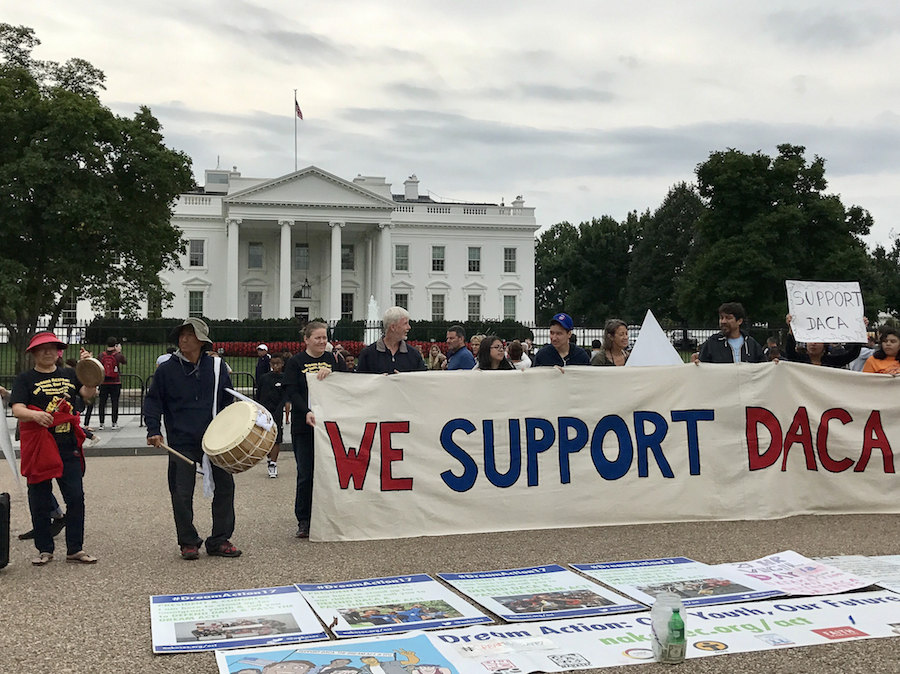DACA Rescinded—Fallout Is Political, Economic, Personal
Protesters have gathered at the White House, high school students have walked out and a Hispanic leader has quit the Trump administration's diversity council. A demonstration at the White House on September 1, 2017 in support of the Obama administration program known as Deferred Action for Childhood Arrivals, or DACA. (Joe Flood / CC 2.0)
A demonstration at the White House on September 1, 2017 in support of the Obama administration program known as Deferred Action for Childhood Arrivals, or DACA. (Joe Flood / CC 2.0)
Attorney General Jeff Sessions announced Tuesday that the Trump administration will officially rescind the Deferred Action for Childhood Arrivals (DACA) program in six months. The Obama-era program began in June 2012, seeking to protect from deportation nearly 800,000 people who were brought into the country illegally as children and providing them with work visas. Sessions said the DACA program was a “circumvention of immigration laws” and an “unconstitutional exercise of authority by the Executive Branch.”
In a subsequent press release, Palomarez said the Trump administration’s decision to rescind the DACA program is “disgraceful” and runs contrary to not only American values, but the administration’s own promise to focus specifically on illegal immigrants who have committed violent crimes and pose a threat to communities.
“Let’s lay the truth bare: President Trump has knowingly deceived the American people over the past seven months about his intentions to protect the innocent young men and women of the DACA program. ‘Rest easy,’ he assured Dreamers, while clarifying that his administration was, ‘not after the Dreamers, we are after criminals,’ ” Palomarez said in a statement.
“Now, they cannot rest easy. Now, they will be awake at night wondering whether tomorrow will be their last day on American soil.
“The president misled our country by fabricating a position and making [a] promise, only to turn around and do the complete opposite. This administration’s pro-growth agenda has sadly fallen to irrelevancy with the president’s lack of leadership, constant distractions, and inability to unite the country.”
CNN Money notes that ending DACA will likely deliver a hit to the national economy:
“Getting rid of DACA reduces the number of skilled workers and a lot of industries are facing worker shortages,” says Ike Brannon, a visiting fellow at the Cato Institute, a conservative research group. “To push this now is really an inopportune time.”
Brannon estimates that repealing DACA would also hit the U.S. government by deporting taxpayers. He forecasts a potential $60 billion loss in tax revenue to the federal government and $280 billion hit to economic growth over 10 years.
Sen. Thom Tillis, R-NC, said on Twitter that immigration policy should be set through legislation, rather than executive order, and that he intends to introduce legislation for undocumented children to earn legal status.
Immigration policy must be set through legislation, not executive orders. (2/9)
— Senator Thom Tillis (@SenThomTillis) September 5, 2017
CNN points out that there is a window in which Congress might be able to save DACA:
The move sets a clock for Congress to act to preserve the program’s protections before the DACA recipients begin losing their status March 5, 2018.
In a statement, House Speaker Paul Ryan reiterated his aspiration that Congress will reach a solution in time. “It is my hope that the House and Senate, with the president’s leadership, will be able to find consensus on a permanent legislative solution that includes ensuring that those who have done nothing wrong can still contribute as a valued part of this great country,” Ryan said.
CNN adds that if Congress does not act and DACA expires, around 300,000 people will lose their status in 2018, and more than 320,000 would lose their status in 2019.
Independent journalism is under threat and overshadowed by heavily funded mainstream media.
You can help level the playing field. Become a member.
Your tax-deductible contribution keeps us digging beneath the headlines to give you thought-provoking, investigative reporting and analysis that unearths what's really happening- without compromise.
Give today to support our courageous, independent journalists.






You need to be a supporter to comment.
There are currently no responses to this article.
Be the first to respond.